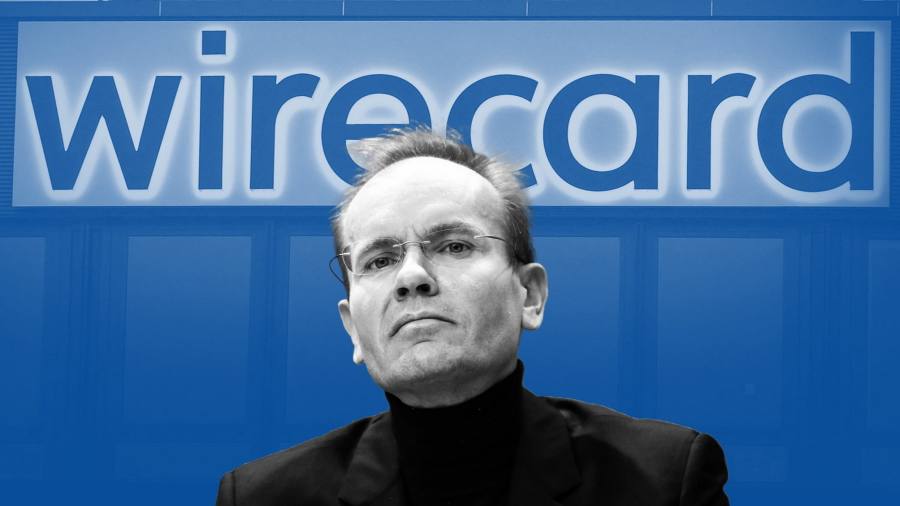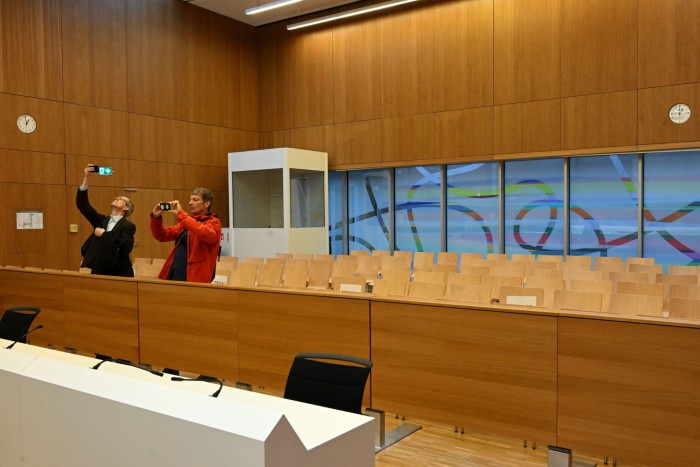
From Thursday, two and half years after one of Europe’s most spectacular accounting scandals unravelled, a criminal court in Munich will start dissecting the collapse of Wirecard.
Three former senior managers of the disgraced German payments company, including chief executive Markus Braun, will be facing charges of fraud, embezzlement, and accounting and market manipulation in a trial that is expected to continue into at least 2024.
Wirecard, once worth €24bn and hailed as one of Europe’s most successful tech start-ups, collapsed in June 2020 after disclosing that half of its €2bn in annual revenue and €1.9bn in corporate cash were a sham. The implosion sent shockwaves through Germany’s financial and political establishment.
In the dock alongside Braun will be Stephan von Erffa, the head of accounting, and Oliver Bellenhaus, the boss of a Dubai-based subsidiary at the core of Wirecard’s outsourced Asian operations.
“I expect that the defendants will face the full force of the law,” Matthias Hauer, an MP for the Conservative CDU who sat on the parliamentary inquiry committee, told the FT, pointing to the “massive social and economic damage” that white-collar crime is causing.
“Confidence in Germany as a financial hub has been shattered. Rebuilding it will require a full legal reckoning,” he said.
The trial will take place within the precincts one of Germany’s largest prisons, opened in 1894, in a high-security courtroom 5 metres underground and protected by a bombproof ceiling.
Built for trials of terrorists and mobsters in 2016, it is connected to the cells by a network of tunnels and is just a 20-minute drive from Wirecard’s former headquarters.

On Thursday, prosecutors will read out 89 pages of charges, alleging that Braun was the head of a gang that orchestrated a complex, multiyear fraud that included deceiving auditors with fake documents, using doctored accounts to convince banks and bondholders to provide more than €3bn in debt, and siphoning off at least €255mn in corporate cash, mainly through loans to sham business partners.
Three prosecutors led by Matthias Bühring will read in turns, having practised the task extensively over the past few weeks, according to people familiar with the matter.
Bühring has been in charge of the investigation since it was triggered by a criminal complaint from Chris Hohn, activist short seller and manager of $24bn of assets at The Children’s Investment Fund, a month before the insolvency.
Prosecutors expect that reading out all the charges will take about five hours. This year, five more court days are scheduled, with Braun and Bellenhaus, who are still in custody, expected to give their opening statements. Von Erffa, who was released on bail in the summer of 2021, will remain silent “for now”, according to his lawyer.
The first witnesses are to be summoned from January.
“After the first few days, the hearings could turn into a slow grind,” said Matthias Jahn, a Frankfurt law professor and criminal judge at Frankfurt higher regional court, adding that Germany’s criminal code stipulates all evidence needs to be directly evaluated in the courtroom.
In the US and other jurisdictions, judges can focus on key documents and facts, said Jahn, but in Germany “every email and every document that is potentially relevant needs to be introduced into the hearing”.
“This procedural approach worked well for the straightforward cases of the 19th century, but struggles to cope with hugely complex cases of our times,” Jahn added.
Like all criminal court proceedings in Germany, the Wirecard case will not involve a jury. It will instead be decided by a panel of three professional judges and two “lay” judges — members of the public who are deputised for the duration of the trial.
The trial will also start with a reserve bench of two professional and two “lay” judges who will attend every hearing and can take over should one of the original judges become unable to continue.
The panel is headed by presiding judge Markus Födisch, a 48-year-old who started his career with Bavarian law-enforcement authorities in 2001 and from 2012 to 2019 held a senior position at the Munich public prosecution office.
During their 21-month long investigation, prosecutors held 450 interviews with witnesses and suspects, sifted through 42 terabytes of data, raided 40 properties and sent out 90 requests for co-operation to foreign colleagues.
At the core of the investigation was Wirecard’s outsourced payments processing operations in Asia — the so-called third party acquiring business, known as TPA. On paper, Wirecard was co-operating with three firms in Dubai, Singapore and Manila which generated €1bn in annual revenue and all of the firm’s profit.
In theory, the TPA business had €1.9bn in Wirecard cash tied up in escrow accounts, first in Singapore and later in Manila.
After the Financial Times in October 2019 exposed that large parts of the TPA business appeared fraudulent, it became clear that bank statements were forgeries: the escrow accounts and billions in cash did not exist. After months of investigations, both Wirecard’s administrator and Munich prosecutors concluded it was a sham, existing only on spreadsheets compiled to hoodwink auditors, investors and creditors.
Braun, who denies the charges, vehemently disputes that the TPA business was fake. He argues that a criminal clique around Jan Marsalek, Wirecard’s second-in-command, and Bellenhaus, created a “shadow structure” and redirected the TPA proceeds into their own pockets, without his knowledge.
Braun’s lawyer Alfred Dierlamm — one of Germany’s most renowned white-collar crime specialists — points to payments of millions of euros between the TPA partner companies and shell companies, some of which were controlled by Bellenhaus and based in the British Virgin Islands.
Dierlamm has previously accused prosecutors of not investigating the origin and purpose of those payments, and hence not getting to the bottom of the case.
Authorities reject Dierlamm’s view, arguing that the payment flows he observed represent round-tripping transactions — circular flows of money used to make the whole system more credible. Dierlamm did not respond to an FT request for comment for this article. The prosecution office declined to comment.
Prosecutors face several obstacles in bringing a conviction.
The inner circle at Wirecard relied heavily on the Telegram messaging app, and the bulk of their conversations have been lost. In official emails, there is little trace of the fraud and there is no smoking gun showing that Braun actually knew the TPA business was a sham.
Moreover, a number of key suspects will not be present in Munich — the most prominent being Marsalek. He was directly in charge of the TPA operations and has been on the run since June 2020, with German law-enforcement authorities assuming he is hiding in Russia.
An ex-Wirecard employee who was in charge of the potentially fraudulent Manila-based outsourcing partner was reported dead in the Philippines shortly after the company imploded.
The case against Braun may hinge on testimony by Bellenhaus. A sports-car enthusiast who ran a Wirecard unit at the heart of the company’s fraud from his apartment in Dubai’s Burj Khalifa skyscraper, he voluntarily travelled from the emirate to Munich, via Switzerland, after the insolvency. There, he turned himself in to prosecutors, knowing he would remain in police custody, according to people familiar with the matter.
“Mr Bellenhaus intends to continue his co-operative behaviour as chief witness during the trial,” his lawyers said in a press release, adding that their client would “take responsibility” for his actions.
But when first giving testimony, Bellenhaus made factually incorrect statements, according to people familiar with the case. He also belatedly disclosed a private foundation in Liechtenstein where he had stashed away some €4.5mn of Wirecard cash.
While some of Bellenhaus’s oral testimony has been backed up with hard evidence — for instance the claim that von Erffa faked documents — a lot could not be independently verified and is disputed by Braun, according to documents seen by the FT.
“The whole case is monstrously big,” said Frankfurt law professor Jahn. More than 20 former insiders are also in the crosshairs of criminal prosecutors.
“Any verdict might come with the caveat that it could be preliminary,” said Jahn.